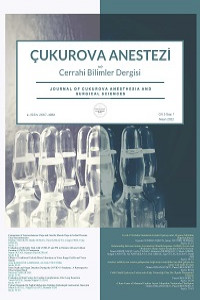Abstract
Gebeliğin hipertansif bozukluklarından ağır preeklampsidekalp durması daha fazladır. Bu yazıda, postpartum dönemde idiyopatik ventriküler fibrilasyona (VF) bağlı kardiyak arrest gelişen 29 yaşında, 25 haftalık preeklamptik çoğul gebe hastayı sunmayı amaçladık. Gebeliğinin 24. haftasında şiddetli preeklampsi ve albuminüri nedeniyle kadın doğum kliniğine yatırılan hasta tansiyon regülasyonu sonrası taburcu olup bir hafta sonra hipertansif krizle hastaneye yeniden başvurdu. Hastaya sezaryen uygulandı. Hiperkalemi gelişmesi nedeniyle yoğun bakım ünitesine (YBÜ) yatırılan hastanın elektrolit dengesizliği düzeltildi. Yoğun bakım takibinde tanıklı VF gelişen hastaya kardiyopulmoner resüsitasyon (KPR) uygulandı ve başarılı KPR'den 8 saat sonra tam nörolojik iyileşme ile ekstübe edildi.
Maternal kardiyak arrest (MCA) nadir görülen bir klinik durumdur. MCA'larda en sık obstetrik faktörler doğum sonu kanama, amniyotik sıvı embolisi iken, obstetrik olmayan faktörler ise en sık serebrovasküler olay, kalp ve solunum yetmezliğidir. MCA'nın erken tespiti ve etkili yönetimi anne prognozunun iyileşmesine katkıda bulunur.
Abstract
Severe preeclampsia, one of the hypertensive disorders of pregnancy and cardiac arrest is higher in these patients. In this letter, we aimed to present a 29-year-old, 25-week preeclamptic multiple pregnant patient who developed cardiac arrest due to idiopathic ventricular fibrillation(VF) in postpartum period. The patient, who was hospitalized in obstetrics clinic due to severe preeclampsia and albuminuria at the 24th week of pregnancy, was discharged after blood pressure regulation. One week later she readmitted to hospital with hypertensive crisis. patient underwent cesarean section. She was admitted to intensive care unit (ICU) due to development of hyperkalemia. Electrolyte imbalance was corrected. Cardiopulmonary resuscitation (CPR) was applied to the patient who developed witnessed VF during her ICU follow-up, and she was extubated with complete neurological recovery 8 hours after successful CPR.
Maternal cardiac arrest (MCA) is a rare clinical condition. While the most common obstetric factors in MCAs are postpartum hemorrhage, amniotic fluid embolism, the most common non-obstetric factors are cerebrovascular accident, heart and respiratory failure. Early detection and effective management of MCA can improve maternal prognosis
Details
| Primary Language | English |
|---|---|
| Subjects | Intensive Care |
| Journal Section | Letter to Editor |
| Authors | |
| Publication Date | April 30, 2022 |
| Acceptance Date | April 30, 2022 |
| Published in Issue | Year 2022 Volume: 5 Issue: 1 |


